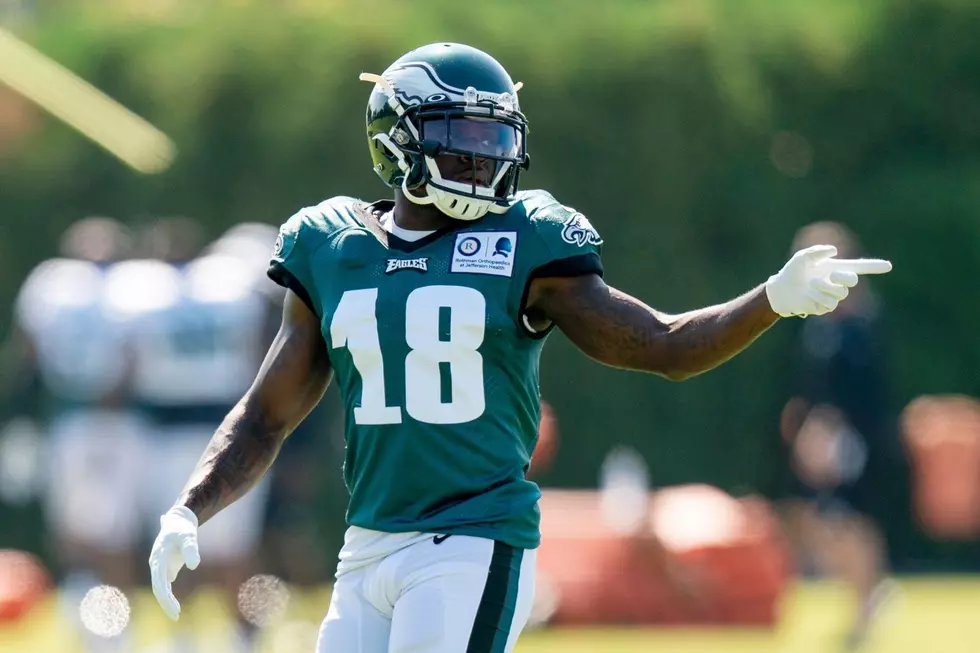
Eagles at Washington: 5 Observations From a Stunning Loss
The Eagles came out firing on all cylinders on Sunday, jetting out to a 17-point lead to kick off the season, but struggled to maintain efficiency in the second half. While pressure and turnovers catalyzed Washington's victory, the Eagles provided little resistance along the way.
Below are five observations from Sunday's loss.

1. Fast starts all-around
After two season of largely stagnant play and slow starts, it appeared the Eagles had finally hit their stride.
Carson Wentz started the game sharp, completing 14-of-18 pass attempts for 174 yards and two touchdowns with roughly three minutes to go until half time.
He remained poised under duress, connecting with his tight ends and completing the underneath throws when pressure mounted.
The defense was fast-flowing to the football and aggressive when the ball was in the air. Brandon Graham and Malik Jackson flashed in the backfield so quickly it felt as though they were teleported. The secondary kept Terry McLaurin and Steven Sims Jr. under wraps and never allowed Dwayne Haskins to complete a pass over their heads.
The Eagles reeled off 17 unanswered points, and at one point in the first half, a 40-point offensive outpouring felt almost inevitable.
2. Reagor Bombs
The Eagles placed emphasis on adding speed to the offense over the offseason.
The Eagles got an early return on their first-round investment, Jalen Reagor, late in the first quarter.
Backed up in their territory, Carson Wentz unhinged a 55-yard deep strike to the rookie. Wentz delivered a perfect pass to Reagor, who had a step on former Eagles cornerback Ronald Darby.
This play was notable for several reasons. Without a traditional offseason, it was widely expected that it would take a few weeks for young players to find their footing. In addition to the learning curve, Reagor suffered a shoulder injury late in training camp, and was expected to miss the first two weeks of the season. To see him in the starting lineup and establishing early timing with Carson Wentz was encouraging.
3. Second half house of cards
The Eagles of old soon revealed themselves in the second half.
Despite working with a patchwork offensive line, Wentz held onto the ball too long, taking sacks rather than safely tossing the ball out of bounds. Following his hot start, Wentz completed just 8-of-21 pass attempts for 71 yards and two interceptions. He didn't set his feet and rushed his throws, sailing passes and overthrowing open receivers. The turnovers spearheaded a 27-unanswered point onslaught.
The defensive appeared gassed, missing routine tackles and struggling to maintain gap control as rookie Antonio Gibson and veteran Peyton Barber continued to find running room. Logan Wilson found success over the middle of the field and began to establish a rapport with Haskins.
4. Offensive line woes
When the Eagles elected to start Nate Herbig at right guard and rookie Jack Driscoll at right tackle, effectively leapfrogging projected starter Matt Pryor. While Pryor's insertion wouldn't have helped matters, it was still puzzling to see a player who received much of the first-team snaps take a back seat.
Herbig and Driscoll held their own early in the game, standing tall against an aggressive and deep Washington defensive front. However, the second half told a vastly different story, as both players were primary culprits on a largely porous offensive line. After finding early success, the offensive line fell victim to Washington defensive coordinator Jack Del Rio's aggressive, complex pass rush approach, surrendering eight sacks and allowing 14 hits on Wentz.
When Driscoll was forced to exit the game prematurely after getting shaken up while making a tackle, Jordan Mailata replaced him. As expected, this yielded similar results.
Regardless of whether or not Johnson and Driscoll are available next week, it would behoove the team to bring in veteran offensive tackle Cordy Glenn, who they recently worked out.
5. Special teams holds firm
Washington wide receiver Steven Sims Jr. was among the NFL's most efficient kick returns in 2019, returning one for a touchdown and averaging 25.6 yards per run-back.
Amid cutdowns, the Eagles managed to retain several core special teamers in Alex Singleton, Duke Riley, Craig James, Rudy Ford, and Marcus Epps -- and it would take a collective effort to slow Sims.
While Sims never had an opportunity to return a kick, he averaged just 3.8 yards per punt return on four attempts. Credit gunners Craig James and Rudy Ford for collapsing running lanes. The latter was often the first man down the field and made an excellent tackle to stop Sims in his tracks.
More From 920 ESPN New Jersey










